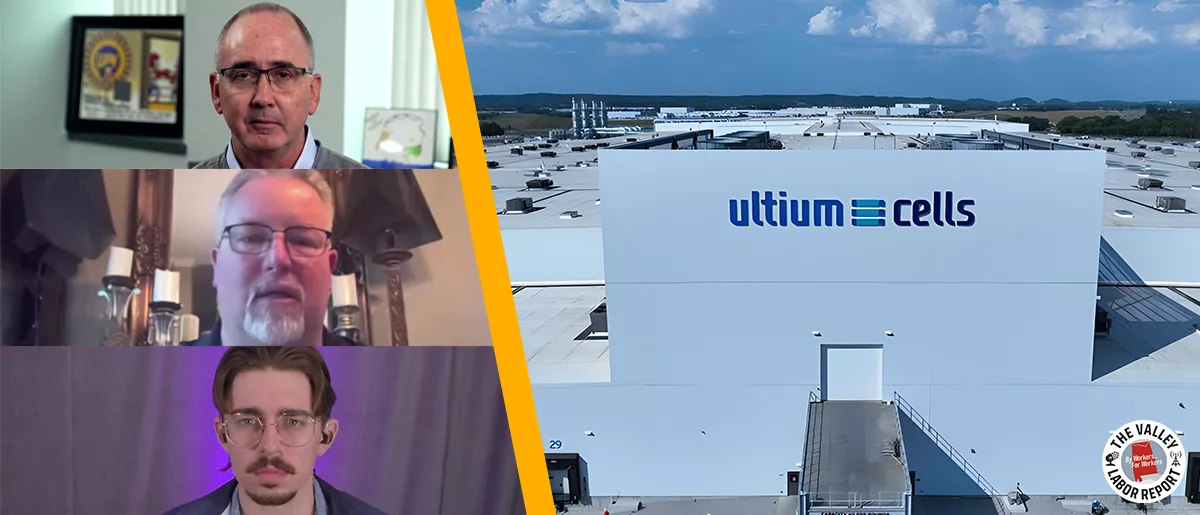Workers at Ultium Cells, based in Spring Hill, Tennessee, have won big. Chuck Davenport, Servicing Representative for UAW Region 8, joined us on this past Saturday’s broadcast to talk about the huge victory. But before detailing the gains, it’s important to explain what exactly the workers were fighting against, and Davenport was able to set the stage for us during the interview.
“These Big Three companies [GM, Ford, and Stellantis] are teaming with these foreign country companies… and they’re coming over here for the technology, but the problem is they don’t have OSHA standards from where they’re at, they don’t have regular working conditions, work rules,” Davenport explained. “It’s really concerning… especially when it comes to health and safety of the workplace.”
According to Davenport, Ultium Cells plants operate very differently from other major U.S. plants like General Motors, utilizing a lot more automation than is usual in a more typical assembly plant. But for him and other workers at the plant, that’s part of the problem, as the automation processes can be haphazard and dangerous to work with.
Davenport went on to explain that the very first Ultium Cells plant, established in Lordstown, Ohio, initially had “a lot more accidents, a lot more issues with OSHA,” which led to the company tightening things up and doing at least somewhat better with safety regulations by the time the second site was established in Tennessee, which Davenport expresses some thankfulness for.
“It’s very important that we follow all these health and safety standards, so it keeps the people safe, so they come to work and they’re able to go home the same way they got there that day,” said Davenport.
Despite some increased safety at the Tennessee plant, it was still far below regulation standards.
But that is far from being the only issue workers at the Ultium Cells plant have been facing, with another prominent one being the wages, which were significantly less than what workers typically make with other Big Three plants. However, after witnessing what had been happening in recent years with unions and unionizations at Big Three plants, Ultium Cells elected to try to dissuade organization via some shifty means.
“Some of the people there on our bargaining committee, when they started… here in Spring Hill in December 2023, they were quoted a wage of $20.27,” said Davenport. “But because the Ultium Cells [plant] in Lordstown was coming up out of the National Agreement, they were really trying to buy the employees here in Spring Hill and offer them wages under the National Agreement even before they got unionized, so they did that basically almost nine months early, so when one of our bargaining committee… came to work in January 2024, he went from $20.27 and then he was quoted at $26.91 before he started.”
According to Davenport, while the company was clearly trying to pitch this as a great deal coming from the goodness of their hearts, it was clear to him and the workers that this was intended to dissuade the workers from unionizing, because “hey, if the wages are great then there’s no need to organize, right?” But unfortunately for the bosses, workers are very aware of this tactic.
“A lot of people, thank goodness, they recognized that the company wasn’t just giving them increased wages because they liked them,” explained Davenport, “they were giving them increased wages because they didn’t want them to be unionized.”
And because of the workers unionizing when they did with the United Auto Workers, they were able to get in on the new National Agreement when it went into effect, though with some addendums at the local level specific to their facility.
As of the interview on Saturday, over 90% of the workers have joined the union, and they are working hard to reach the remaining people who haven’t made a decision yet. But Davenport feels pretty confident that the results of unionizing will speak for themselves to the remaining unorganized workers.
“We don’t want to alienate the people that [aren’t union members], we’re still trying to pull them into the fold,” said Davenport. “They’re already seeing the benefits of a union contract, I mean they just got paid yesterday, a $3,000 lump sum payment that came out of negotiations of the contract.”
To learn more details about what exactly the union at Ultium Cells won, watch our full interview with Chuck Davenport:
